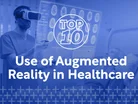Top 10: Uses of Augmented Reality in Healthcare

Augmented Reality (AR) is transforming the healthcare sector, offering new ways to enhance patient care, medical education and clinical practice.
AR technology overlays digital content onto the physical world via devices such as smartphones, tablets or specialised glasses to superimpose digital information onto the user's view of the real world.
In a healthcare context, this capability is being harnessed to improve various aspects of medical practice and education.
Here, we look at 10 clinical applications of AR technology.
10 Breastfeeding guidance
AR can help new mothers with the often problematic process of breastfeeding. Using special glasses, or a mobile device, to see virtual overlays and instructions during breastfeeding, AR can guide correct positioning, ensuring the baby receives optimal nutrition and reducing discomfort for the mother.
Healthcare professionals can also remotely monitor breastfeeding sessions, offering real-time feedback and guidance to new mothers.
09 Patient communications
AR is also finding applications in patient education and communication. By providing visual representations of medical conditions and proposed treatments, healthcare providers can more effectively explain complex medical information to patients. This can lead to better patient understanding and potentially increased treatment adherence.
08 Vein location
AR apps can overlay a 3D map of the patient’s veins onto their skin, allowing clinical staff to see veins in real-time, reducing the number of times a needle needs to be inserted.
It can help medical professionals locate veins for procedures including blood draws, and IV starts, which not only improves the efficiency of these procedures but also reduces the risk of complications, such as infection.
07 Pain management
AR can provide a non-pharmacological way to manage pain by providing distraction, which has been shown to reduce perceived pain levels.
Patients can wear AR goggles during wound care or physiotherapy to immerse themselves in a calming, virtual environment, shifting focus away from the pain.
AR can also assist with teaching self-management strategies by visually demonstrating techniques including guided breathing exercises.
06 Emergency first-aid provision
AR can help guide people when they need to give first aid. Even for those with no medical knowledge, AR solutions can provide immersive step-by-step instructions on emergency medical procedures and techniques. With CPR, for example, AR can walk people through the steps, and inform a person whether chest compressions are hard and fast enough.
It is a great training tool for professionals, too, helping them deal with anything from a minor injury to a heart attack.
05 Better patient safety
By making drug information more interactive and accessible, AR can help to improve patient safety and outcomes.
It can create interactive 3D models of drugs that can help educate patients about their medications. This can help people understand how their medications work, what side effects to watch for, and how to take them properly.
AR can also provide real-time information about drug interactions and side effects. This can help doctors and nurses make more informed patient-care decisions.
04 Enhanced surgery planning
AR can create 3D models of a patient’s anatomy, which surgeons can use to plan surgeries. This can help identify potential risks and ensure operations are performed as accurately as possible.
It can also help with remote surgery, allowing surgeons to operate on patients located in different parts of the world. This is possible by using AR headsets to project the surgeon’s view of the operating field onto the headset of a remote surgeon. This allows the remote surgeon to see what the local surgeon is seeing and to provide guidance and assistance during surgery.
03 Telemedicine
AR is enabling new forms of remote collaboration among healthcare professionals. Specialists can guide less experienced colleagues through complex procedures in real-time, regardless of geographical location. This capability has the potential to improve access to specialised care, particularly in underserved areas.
02 Neuro-cognitive therapy
AR is increasingly being used to help slow the progress of neuro-degenerative conditions such as Parkinson’s. The Strolll system is one such example. This AR headset-based solution offers therapeutic activities including games. Its solution helps prevent falls among Parkinson’s patients, by managing postural instability and gait dysfunction. Fall risk is heightened when a Parkinson’s patient performs an attention-demanding cognitive task while moving – known as dual-tasking.
01 Improved diagnosis
AR apps can overlay 3D models of the human body onto the patient’s body, allowing them to point to the areas where they feel pain or discomfort. This can help doctors to quickly and accurately diagnose the patient’s condition.
For example, a patient experiencing chest pain can use an AR app to point to the exact location of the pain. This information can help the doctor to rule out certain conditions, such as a heart attack, and to focus on other possible causes of the pain.
- Virginie Helias: How P&G Champions Healthcare SustainabilitySustainability
- AstraZeneca CSO Pam Cheng: Health Equity & SustainabilitySustainability
- McKinsey, GSK & Novo Nordisk: This Week in HealthcareTechnology & AI
- How Cardinal Health Creates Sustainable Supply ChainsMedical Devices & Pharma






